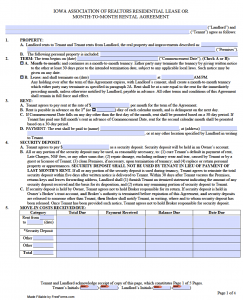
The Iowa lease agreement is the standard form used when an individual, known as the lessor, would like to transfer possession of their property for a specific amount of time. In return, the individual who will be occupying the premises, known as the lessee, will be obligated to pay a periodic rental fee and adhere to the terms & conditions set forth within the contract. Some vital aspects of the agreement that should be settled prior to execution include the security deposit payment, rules & regulations of the property, and date in which the rent is due. Once completed and signed, the participating parties will be legally liable to honor the terms of the document.
Rental Application – Purveys an extensive inquiry into the identity and background of an individual applying for tenancy of a property. The form assists in prompting the potential occupant to fill the landlord in with data to help make an informed decision during the lessee selection process.

Iowa Association of Realtors Residential Lease Agreement – The form originated by the Realtor organization to facilitate a leasing agreement transaction. This document is specifically provided by the Iowa State affiliation of Realtors to simplify the recording of the pertinent information.
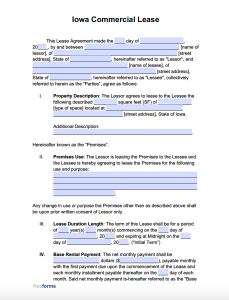
Commercial Lease Agreement – Commonly executed by business owners, this document works as a contract for the purpose of renting a property that will be used to contain a shop/store, company office, retail location, etc.
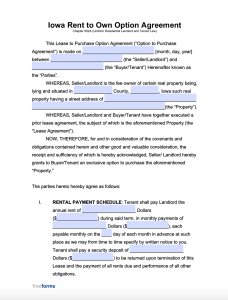
Lease to Own Agreement – This document gives the lessee the right of first refusal during the term of the lease, which basically means they have the exclusive rights to purchase the property and may approve or deny a third party bid depending on whether or not they would like to buy the real estate themselves.
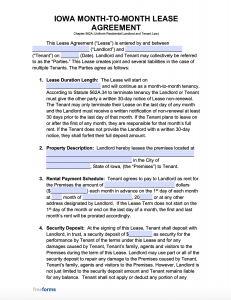
Month-to-Month Lease – This type of contract only lasts a term of one (1) month at a time. As long as thirty (30) days’ notice is provided, either side of the agreement may terminate the tenancy whenever they wish (§ 562A.34(2)).
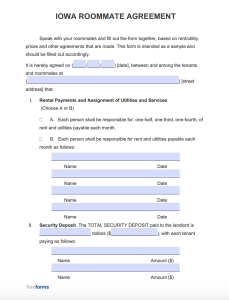
Roommate Agreement – Specific to the rental of a room/section of a residential dwelling, this agreement allows users to document the terms of an arrangement shared by a current tenant and new housemate.
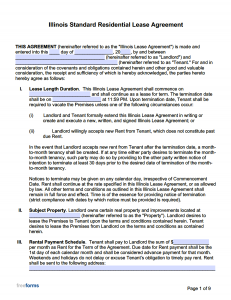
Standard Lease Agreement – Composes a legal representation of the commitments included in the arrangement to rent a piece of property to an official binding accord.
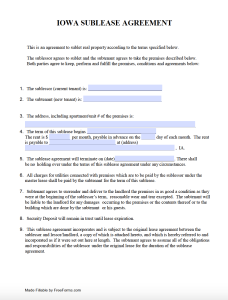
Sublease Agreement – A well-known contract in the leasing world, this form can be utilized by an existing tenant who would like to rent the property they occupy to a new tenant.
For a full listing of the legal statutes that dictate the proper conduct between property holders and their occupants, view Chapter 562A (Uniform Residential Landlord and Tenant Law) of Iowa’s property laws. Also, the state’s Legal Services Division offers a Legislative Guide for Landlord-Tenant Law that can help interested parties understand the local regulations in a more comprehensive way.
Contact Details ( Environmental Protection Agency (§ 562A.13(6)) – If the property is registered in the EPA’s Comprehensive Environmental Response, Compensation, and Liability Information System, the landlord Lead-Based Paint (42 U.S. Code § 4852d ) – A federally imposed law, this disclosure is only applicable to housing built before 1978 and requires the individual who is authorized to rent the property to notify potential tenants of any known lead hazards that may be present within the structure. Also, an informative packet that is endorsed by the EPA should be included within the rental agreement to educate occupants on the dangers associated with coming into contact with the harmful substance.
Rent Increase ( § 562A.13(5)) – If the landlord/lessor intends to raise the amount of rent, they must send a written notice to all applicable tenants within a minimum of thirty (30) days before the commencement date. (This will not affect the tenant until the expiration of the original lease agreement.)
Utility Costs ( § 562A.13(4)) – Before the execution of the lease agreement, the tenant must be furnished with a full disclosure detailing all the rates and expenses associated with the utility services provided within the residence (only necessary if the landlord is in charge of the utility billing).
Iowa provides no obligatory grace period for making a rent payment. All rent payments are owed on the time & place noted within the lease agreement, otherwise, the tenant may be charged a late fee ( § 562A.9(3)). If overdue rent remains unpaid after receiving a three (3) day notice of nonpayment, the landlord has the authority to terminate the rental contract ( § 562A.27(2)).
Properties that have a monthly rental fee of $700 or less may only charge $12 per day or a maximum of $60 per month. If the property’s rental fee exceeds $700 each month, the charge for a late rent payment may not be greater than $20 per day or a maximum of $100 per month ( § 562A.9(4)).
If the lessor is provided with a bad check, they are entitled to receive compensation for the amount transcribed to the instrument and reimbursement for any fees they may have been charged by their financial institution when depositing or cashing the payment. They must supply the tenant with a ten (10) notice informing them that the check received was dishonored along with the sum of money owed. Tenant’s refusal to pay within the ten (10) day time frame can result in further legal action (§ 714.1(6)).
Two (2) months’ rent is the most a landlord may charge for the total of a security deposit (§ 562A.12(1))
Once the term of the lease agreement has ended, the landlord will have thirty (30) days to return the tenant’s security deposit funds, so long as the tenant provides a new mailing address (§ 562A.12(3)(a)).
If a landlord needs to access a tenant’s property for repairs, services, showings, etc., the state mandates that the landlord gives the tenant a minimum of twenty-four (24) hours notice of entry, unless it is an emergency (§ 562A.19(3)). All entries must be within “reasonable” hours of the day.